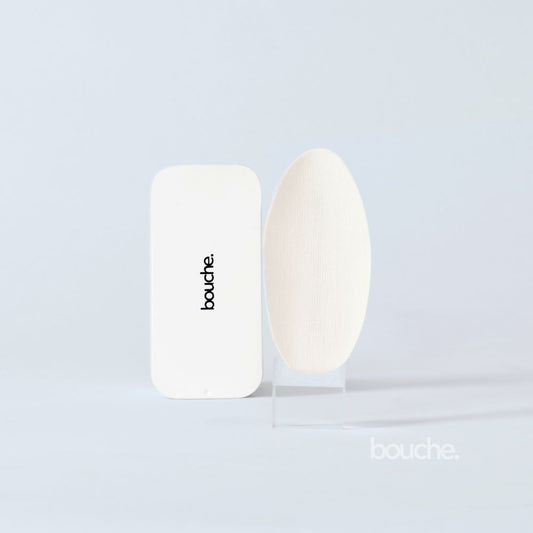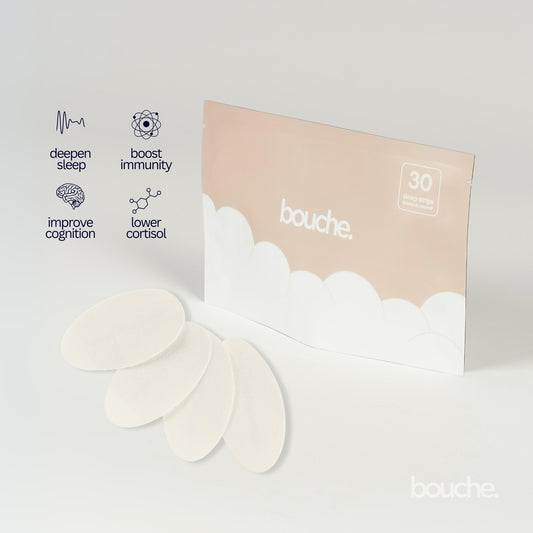Key Takeaways
-
Mouth tape is an adhesive strip applied over the lips to encourage nasal breathing during sleep, which can reduce snoring and improve sleep quality.
-
Scientific studies suggest that for individuals with mild obstructive sleep apnea (OSA), mouth taping can significantly decrease the apnea-hypopnea index and reduce snoring frequency.
-
For those using CPAP machines, the best mouth tape for CPAP users can prevent air leaks from the mouth, making the therapy more effective and comfortable.
-
When selecting a sleep tape, prioritize hypoallergenic, medical-grade materials to prevent skin irritation. The best tape for mouth taping should be gentle yet secure enough to last through the night.
-
While mouth taping may not dramatically alter an adult's jawline, it promotes correct tongue posture and nasal breathing, which are fundamental to healthy facial development and can lead to subtle improvements in facial tone.
Quality sleep is the foundation of physical health and mental clarity. If you often wake with a dry mouth, struggle with snoring, or use a CPAP machine, you might be looking for a science-backed, non-invasive way to improve your rest. The best mouth tape for sleeping is gaining popularity for its ability to promote nasal breathing and enhance sleep quality, especially with features like CPAP compatibility and hypoallergenic design.
This guide provides a comprehensive comparison of the best mouth tapes, including options for CPAP users, those with sensitive skin, and anyone seeking a safe, effective experience.
What Is Mouth Tape and Why Is It Used?
Mouth tape is a soft, skin-friendly adhesive strip applied over the lips before sleep. Its primary purpose is to train the body to breathe through the nose, a practice linked to numerous health benefits. By keeping the lips sealed, it helps:
- Encourage consistent nasal breathing
- Reduce snoring and morning mouth dryness
- Support better oral health and hydration
- Enhance deep, restorative sleep stages
Switching from mouth to nasal breathing at night is associated with better sleep and improved hydration. When used correctly, a quality mouth tape can offer both immediate and long-term benefits, particularly for those with mild sleep apnea or who use a CPAP device.


- Save 65%
The Scientific Case for Mouth Taping
Several peer-reviewed studies support the connection between nasal breathing and improved sleep. Research has shown that mouth taping can decrease the apnea-hypopnea index (AHI) and snoring frequency in people with mild obstructive sleep apnea (OSA). Encouraging airflow through the nose reduces mouth dryness and supports a balanced oral microbiome.
Furthermore, mouth taping helps facilitate correct tongue posture, which keeps the airway open and may reduce issues like teeth grinding. For those using a CPAP machine, the best mouth tape for sleep apnea can minimize air leaks from the mouth, supporting consistent therapy without the need for uncomfortable chin straps. It is important to ensure you have clear nasal passages before using any mouth tape and to consult a healthcare professional if you have significant breathing difficulties or moderate to severe OSA.
Key Features in the Best Mouth Tapes
When choosing a mouth tape for sleep, consider these important features:
|
Feature |
Why It Matters |
|
Hypoallergenic Material |
Protects against skin irritation and allergic reactions. |
|
Medical-Grade Adhesive |
Ensures the tape is gentle on the skin but stays on all night. |
|
Breathable & Latex-Free |
Reduces sweating and minimizes the risk of skin issues. |
|
CPAP Compatibility |
Prevents air leakage for those using nasal CPAP masks. |
|
Shape & Adjustability |
Accommodates different mouth shapes and works with facial hair. |
Finding the Best Mouth Tape for Your Needs
Best Mouth Tape for CPAP Users
Individuals using CPAP machines often experience mouth leaks, which reduce the therapy's effectiveness and cause dryness. A mouth tape designed for CPAP users can solve this by sealing the lips to maintain optimal pressure, allowing for more comfortable therapy and often replacing the need for a chin strap.
For Sensitive Skin
Hypoallergenic mouth tape is essential for those with delicate skin. A quality tape will use a medical-grade adhesive that is free of latex, BPA, dyes, and fragrances. This focus on clean materials supports nightly comfort, which is crucial for consistent use.
For Facial Hair
Beards can prevent many tapes from sticking effectively. Look for flexible, stretchy strips that can adapt to different face shapes and create a durable seal that won’t slip or leave residue, even through facial hair.
Comparing the Best Mouth Tape Brands
|
Brand |
Hypoallergenic |
CPAP Compatible |
Works with Beards |
Skin Friendly |
Key Features |
|
Bouche |
Yes |
Yes |
Yes |
Yes |
Medical-grade, North American made, no dyes/fragrance |
|
Dream Recovery |
Yes |
No |
No |
Yes |
Eco-friendly bamboo silk |
|
Hostage Tape |
No |
Yes |
Yes |
Some users report stickiness |
Strong adhesive, extra-large size |
|
SomniFix |
Yes |
No/Partial |
No |
Yes |
Breathable, vented design |
|
MyoTape |
Yes (Certain models) |
No |
Partial |
Yes |
Surrounds the lips, elastic material |
Among the best mouth tape brands, Bouche stands out as a premium option, delivering comfort, reliability, and specific advantages for CPAP users, individuals with beards, and those with sensitive skin.
Can Mouth Taping Reshape Your Jawline?
The notion that mouth tape can improve jawline definition comes from the science of facial development. Chronic mouth breathing, especially during childhood, can affect how facial bones and muscles develop, sometimes leading to functional and aesthetic dental issues. By promoting nasal breathing, mouth taping encourages optimal tongue posture, which supports a well-aligned jaw and proper airway function.
While adults are unlikely to see changes in their bone structure, some may notice subtle improvements in facial puffiness and contour. This is more attributable to better hydration and balanced muscle activity than bone reshaping. Over time, stabilizing tongue posture and breathing patterns can help refine facial tone.
Bouche: Science-Driven Sleep Solutions
Bouche is a premium wellness brand that creates science-backed products for better health. The Bouche Mouth Tape is crafted for comfort, safety, and effectiveness. Produced in North America with hypoallergenic, medical-grade materials, it is trusted by thousands. Whether you need support for your CPAP routine, relief from the best mouth tape for snoring, or a gentle option for sensitive skin, Bouche’s products offer research-informed solutions.
How to Use Mouth Tape for Better Sleep
- Prep Your Lips: Make sure your lips are clean and dry. You can apply a thin layer of lip balm for extra gentleness if needed.
- Apply the Tape: Purse your lips slightly and place the strip horizontally over your mouth to create a comfortable seal.
- Sleep Naturally: Breathe through your nose during the night. In the morning, remove the tape gently.
For those with mild congestion, nasal strips can be a great companion to mouth tape. They are designed to open nasal passages for even better airflow and quieter sleep.
The Takeaway: Better Sleep, Supported by Science
Mouth taping offers a simple, effective method to promote nasal breathing, reduce snoring, and improve sleep quality. When considering factors like CPAP use or sensitive skin, it is wise to select a brand rooted in medical science, with clean, hypoallergenic materials and positive user feedback. For a comprehensive solution, consider the Breathe Better Kit, which combines tools for optimal nighttime breathing.
Frequently Asked Questions (FAQs)
Q. Which mouth tape works best for CPAP users?
Bouche’s mouth tape is specialized for CPAP compatibility. It creates a gentle seal to prevent leaks while remaining comfortable for all-night wear.
Q. Is mouth taping safe for sensitive skin?
Yes, but it's important to choose a true hypoallergenic tape like Bouche, which is free of latex, dyes, and fragrances. Always perform a patch test first.
Q. How quickly does mouth taping reduce snoring?
Many people report a reduction in snoring and better sleep within the first week of consistent nightly use.
Q. What are alternatives to mouth tape for snoring?
Nasal strips (like those offered by Bouche) and internal nasal dilators are common alternatives that also promote nasal breathing.
Q. Can I use any tape as mouth tape?
No, you should never use industrial or household tapes, like duct tape. Only use tape specifically designed for skin, preferably a porous, medical-grade mouth tape that is easy to remove.
Q. What are the potential risks of mouth taping?
The primary risk is obstructing breathing, especially if you have a blocked nose from allergies or a cold. Some studies note a potential risk of asphyxiation if nasal passages are blocked, so it is crucial to ensure you can breathe freely through your nose.
Q. How long does it take to get used to mouth taping?
The adjustment period varies. Some people feel comfortable the first night, while others may need a week or more to get used to the sensation. Starting by wearing the tape for short periods during the day can help.
Q. Can mouth tape help with bad breath?
Mouth breathing at night can cause dry mouth, which contributes to bad breath. By promoting nasal breathing, mouth tape can help maintain moisture in the mouth and may reduce morning breath.








